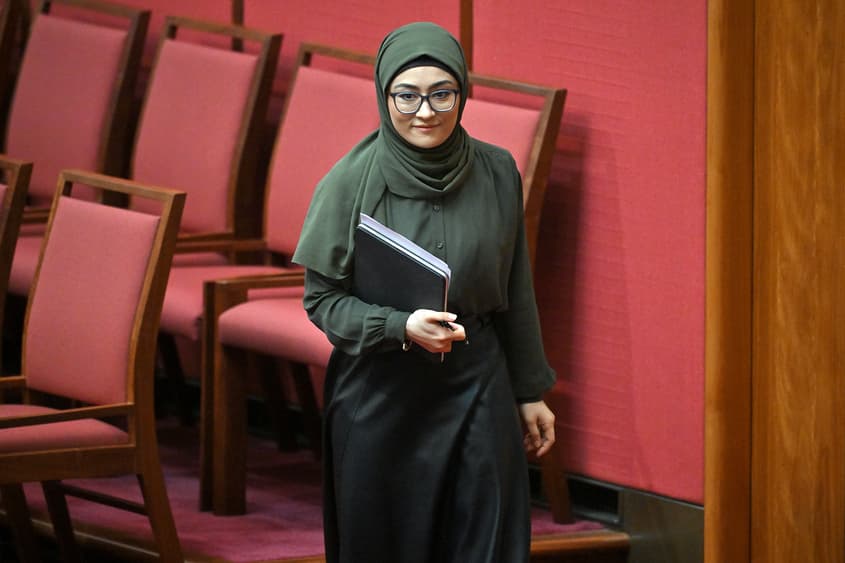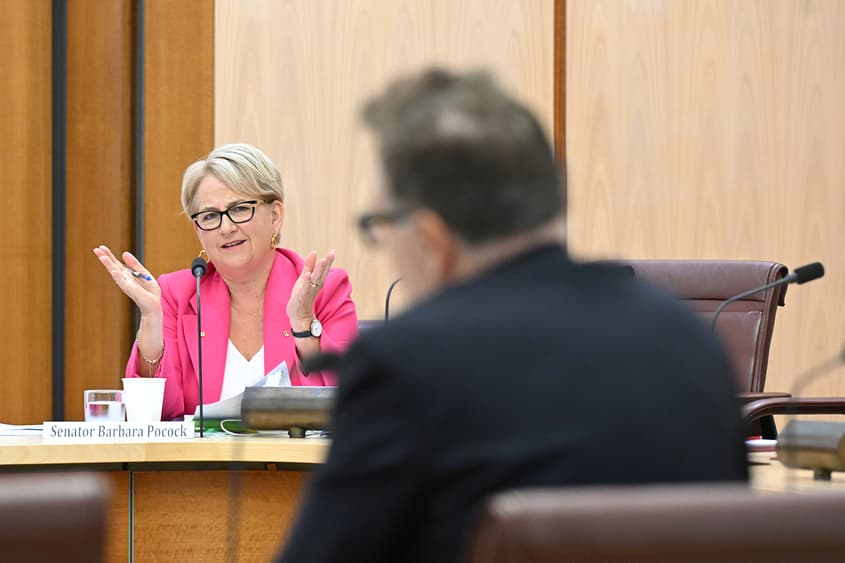Tue 25 Nov 2025 00.00

Independent Senator Fatima Payman after crossing the floor to vote with the Greens, as they suspend standing orders on sanctioning Israel in the Senate chamber at Parliament House in Canberra, Tuesday, August 13, 2024. (Photo: AAP Image/Mick Tsikas)
People often stop me in the street, at the airport, at footy games, and commend me for being brave. I always thank them politely, but the truth is my experiences of sticking to my values felt far more frightening than brave.
We tend to imagine bravery in cinematic terms like the firefighter racing into a burning building, the soldier charging into battle, the whistleblower exposing the truth against all odds. But bravery often happens in quieter, less visible moments where fear is present, heavy and inescapable.
The more I’ve lived and worked in public life, the more I’ve come to realise that bravery isn’t about never feeling afraid. It’s about recognising fear for what it is and choosing to act anyway. It’s a choice open to us all, not just those whose names end up in the history books.
The first bravery I knew was my father’s.
In 1999, he spent 11 days and nights on a small, crowded boat traversing the Indian Ocean, fleeing war-torn Afghanistan. He left behind his pregnant wife and his two little daughters, hoping to find them a safe haven, or die trying.
Life in Australia brought safety but not ease. He worked as a kitchen hand enduring underpayment; as a cabbie weathering abuse; as a security guard working overtime just to give us the best shot in life. He never complained. But I now know he was afraid; afraid of the unknown, of a language he didn’t speak, of a culture he didn’t understand, of a way of life that was completely foreign.
And yet, he would always smile in gratitude. He would tell us to live with integrity, to give back to this nation that gave us refuge, and to never give up no matter the hardship.
I was raised to believe that silence in the face of injustice is itself an injustice. Every day of the last seven years since he passed away from leukaemia, I’ve heard my father’s voice in my head. To me, he is the definition of bravery. I am certain he was scared from the moment he set foot on the boat to the moment he was told he had only a few hours left to live. Afraid of leaving us behind, afraid of the uncertainty we would face without him, and yet he smiled in contentment, knowing he had fulfilled his purpose: to provide for us and raise us with strong values.
I once saw those same values in the Australian Labor Party. Progressive and inclusive policies on social justice. Responsible, measured economic reforms.
When I turned 18 and enrolled to vote, my father told me the Labor Party would always look out for immigrants and those doing it tough. I admired the way Labor wasn’t afraid to challenge the status quo, advocating for nation-shaping policies like Medicare, superannuation and indigenous land rights.
Labor giants like Whitlam, Hawke and Keating led with foresight, bravery and unwavering determination to improve the lives of all Australians, even when it meant facing fierce opposition. I have no doubt they also knew fear — fear of political failure, of public backlash — but acted anyway.
Only later did I understand that progressive politics is not just about climate targets and tax reform. It must also be about moral courage: the ability to say, “Not in our name,” when innocent lives are being destroyed and our government looks away.
That moral courage is on full display in Palestine.
It is present in the little boy carrying his lifeless sister to hospital after his home was bombed. In the strength of the mother rummaging through the rubble to find her children’s body parts. In the father who risks sniper fire to find food for his starving family.
Theirs is the most visceral kind of bravery, living each day not knowing if you will survive, yet continuing to act out of love, duty and hope.
Bravery has a place inside Parliament too, though it often takes a quieter, lonelier form. Sometimes it’s found in building consensus across political divides; sometimes in standing apart when conscience outweighs party loyalty.
As a young hijab-wearing woman in Parliament, my very presence is often read as a statement. But I didn’t want to just be a symbol, I wanted to act with integrity.
On the afternoon I crossed the floor in the Australian Senate, I felt the full weight of that truth. I was afraid. Not of being shouted at or written about. I was afraid of what it meant to defy the tribe, to go against the party that had nurtured me, the colleagues I worked alongside, the structures I had been told were the only way to make change.
And yet, I knew I had no choice.
In June 2024, the atrocities in Gaza had been underway for over seven months. Across Australia, people were pleading for a stronger stance. Constituents called my office in tears. I felt a gnawing guilt that my government’s response was tepid at best, complicit at worst.
Inside Parliament, the pressure to stay silent was overwhelming. When I broke my silence and called the atrocities what they are — genocide — I asked the Prime Minister directly, “How many images of bloodied limbs of murdered children must we see before we name it?”
In that moment, my fate was sealed.
Speaking out meant breaking the rule of caucus solidarity. Crossing the floor meant stepping away from political protection into complete uncertainty. The walk across the chamber is short, but it felt long and lonely. Every step is a declaration that loyalty to conscience outweighs loyalty to the party leadership.
And while the cameras capture that walk, they do not capture the cost: the strained relationships, the isolation, the quiet moments afterwards when the chamber is empty and the ramifications of what you’ve done sink in.
That day, my political life changed. I was indefinitely suspended from the party for upholding the very platform it claimed to defend. My office of Labor loyalists emptied. Colleagues stopped talking to me. There were nights I lay awake wondering if I had just ended my future in politics.
But then came the letters and emails: from young people who had felt powerless until that moment; from Palestinian Australians thanking me for giving voice to their grief; from Jewish Australians relieved to hear a principled stand against the genocide that was not a stand against them.
I realised then that bravery is not about having all the answers. It’s about making the hardest decision in the loneliest room and walking out still able to look yourself in the mirror.
Since that day, I have thought a lot about loyalty. Loyalty to party leadership is one thing. But loyalty to the people who elected you, to your conscience, and to your values must come first.
We are told that change can only happen from within, that we must compromise to keep our seat at the table. But what happens when that table comes with no microphone and demands your silence? What happens when the price of entry is your integrity?
That night, my husband Jacob caught the red-eye from Perth after watching the livestream of me crossing the floor. At the arrivals gate, he wrapped me in his arms and said, “I’m so proud of you! You were so brave.”
Through tears I told him, “I was scared. But I had to do it anyway.”
This is where bravery connects us all.
You don’t need to sit in the Senate to face your moment of conscience. Bravery is in the young woman who challenges a sexist joke in the staffroom when everyone else laughs along; in the nurse who speaks up when patient care is compromised; in the teacher who stands up for a student facing discrimination; in the worker who calls out wage theft, knowing the roster might punish her next week.
In each case, the fear does not vanish. You act because it’s there, not because it’s gone.
Mandela’s words remain true: courage is a triumph over fear, not its absence. My father’s journey, the resilience of Palestinians, the courage of everyday Australians, and yes, my own decision in Parliament … all come back to that same truth.
My father would always say, “Live life with a clear conscience and you have no one to fear.” That clear conscience allows me to sleep at night, knowing that one day I can look my children in the eye and tell them: “Your mum stood for what she believed in.”
Bravery is not defined by stature or by an absence of emotion. It is in the persistence to keep walking a hard road, even when your choice is unpopular. It is in taking a single step in a long journey towards justice. Bravery is never easy, but it is always necessary.
If my act of defiance inspires even one person to speak up, then every cost has been worth it. The loss of my so-called political family, my Labor friends, the professional security that comes with a major party, even my husband’s career.
Looking back, I have no regrets. Because the floor I crossed that day wasn’t just in Parliament. It was the floor between fear and freedom. Between silence and truth. Between who I was and who I chose to be.
Senator Fatima Payman has served as a Senator for Western Australia since 2022, first for the Labor Party and then as an independent after crossing the floor.
This essay is an extract from A Time for Bravery: What Happens When Australia Chooses Courage? published by Australia Institute Press. Publication date: 3 December, pre-order now.
